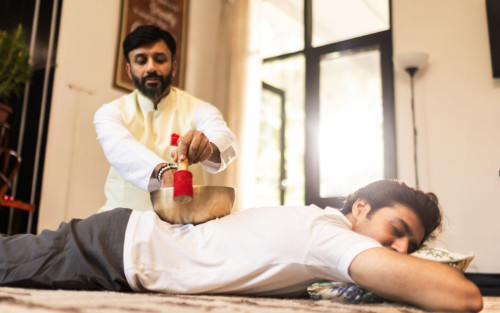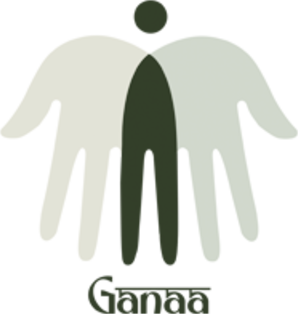






Ganaa – De-Addiction & Mental Health Rehabilitation Chain in India
Verified Center
This provider's information has been quality-checked by Recovery.com's Research Team for accuracy and completeness, including center verification through appropriate third-party organizations.
Treatment Focus
This center treats substance use disorders and mental health conditions. You'll receive individualized care catered to your unique situation and diagnosis, learn practical skills for recovery, and make new connections in a restorative environment.
Primary Level of Care
Offering intensive care with 24/7 monitoring, residential treatment is typically 30 days and can cover multiple levels of care. Length can range from 14 to 90 days typically.
Treatment Focus
This center treats substance use disorders and mental health conditions. You'll receive individualized care catered to your unique situation and diagnosis, learn practical skills for recovery, and make new connections in a restorative environment.
Primary Level of Care
Offering intensive care with 24/7 monitoring, residential treatment is typically 30 days and can cover multiple levels of care. Length can range from 14 to 90 days typically.
Private Pay
You pay directly for treatment out of pocket. This approach can offer enhanced privacy and flexibility, without involving insurance. Exact costs vary based on program and length of stay. Contact the center for specific details.
Ganaa – De-Addiction & Mental Health Rehabilitation Chain in India
Ganaa – De-Addiction & Mental Health Rehabilitation Chain in India
About Ganaa – De-Addiction & Mental Health Rehabilitation Chain in India
Set amid a peaceful landscape, Ganaa - Nature offers refreshing, holistic options for the treatment of substance addiction, behavioral addiction, mental health conditions, or a combination of them. At Ganaa - Nature, clients of all ages receive confidential treatment including detox and inpatient treatment. Each individual’s journey is personalized—whether it’s through yoga, sound healing, nature walks, meditation, or Ayurvedic treatments— Ganaa - Nature invites their clients to reconnect with nature and themselves as they heal.
Benefit from Focused, Customized Attention
Ganaa - Nature bridges the gap in India’s treatment landscape by offering quality, evidence-based care that intertwines ancient wisdom with modern therapeutic techniques. Compassionate care, commitment to excellence, and their calming surroundings form the fabric of Nature’s DNA. With a 2:1 staff-to-client ratio, each client receives focused clinical attention. The expert staff are deeply versed in managing complex and urgent addiction or mental health situations with confidence and precision. Their staff understand that addiction and mental health concerns affect not only the individual, but the family and community as well. Family involvement and ongoing aftercare programs help create a strong support system and prevent relapse. Ganaa - Nature offers a range of services, including diagnostic assessment, medication management, and evidence-based therapies like neurofeedback, cognitive behavioral therapy (CBT) and dialectical behavior therapy (DBT). On top of clinical treatment, they offer customizable wellness programs that emphasize mind-body integration, stress reduction, emotional expression and life skill development.
Reset and Reconnect in Community
Ganaa - Nature’s approach is not about quick fixes, but rather about equipping clients with tools and experiences that effectively lead to positive change. Their programs are designed to help clients reset, destress, and meet them where they are. The center accomplishes this by offering 24/7 nursing care, 1:1 attendant-buddies, and pet therapy. The “buddies” provide emotional and practical support, offering companionship and comfort during treatment. Nature-based experiences are emphasized during treatment, due to the healing power of the outdoors. Clients can go on forest-bathing walks, find solace in hikes with breathtaking scenery, or enjoy the solitude of gardening outside. Ganaa - Nature also emphasizes the importance of community throughout treatment by providing relaxing movie nights, conscious living coaching, and 12-Step programs.
Enjoy a Supportive & Relaxing Atmosphere
The facility is set in a green, peaceful environment that is intended to feel like a home away from home, breaking away from the traditional rehab setting. The center provides a range of comfortable living situations to suit different preferences and needs, including single, double, triple, and quad rooms. Clients can enjoy homestyle gourmet meals that nourish body and mind. For those looking to maintain physical fitness, modern gym amenities are on-site. Evident in the facility and amenities, Nature has created an atmosphere where recovery feels possible.

Center Overview
Treatment Focus
This center treats substance use disorders and mental health conditions. You'll receive individualized care catered to your unique situation and diagnosis, learn practical skills for recovery, and make new connections in a restorative environment.
Pricing and Program Length
Estimated Center Costs
The cost listed here (Rs 90,000 - 5,000,000 per month), is an estimate of program cost. Center price can vary based on program and length of stay. Contact the center for more information. Recovery.com strives for price transparency so you can make an informed decision.
Meet Your Care Team

Dr. Rohit Garg
Founder of Ganaa

Dr. Danish Ahmed
Senior Consultant Psychiatrist

Dr. Mahendra Singh
Consultant Psychiatrist

Dr. Ashish Bansal
Consultant Psychiatrist

Dr. Saurabh Avi
Consultant Psychiatrist
MD in Psychiatry




Levels of Care












Your Care Options
Specializations
Schizophrenia
Schizophrenia is a serious mental health condition that causes hallucinations, delusions, and disordered thinking.
Older Adults
Addiction and mental health treatment caters to adults 55+ and the age-specific challenges that can come with recovery, wellness, and overall happiness.
Adolescents
Teens receive the treatment they need for mental health disorders and addiction, with the added support of educational and vocational services.
Alcohol
Using alcohol as a coping mechanism, or drinking excessively throughout the week, signals an alcohol use disorder.
Bipolar
This mental health condition is characterized by extreme mood swings between depression, mania, and remission.
Holistic
A non-medicinal, wellness-focused approach that aims to align the mind, body, and spirit for deep and lasting healing.
Twelve Step
Incorporating spirituality, community, and responsibility, 12-Step philosophies prioritize the guidance of a Higher Power and a continuation of 12-Step practices.
Who We Treat
Older Adults
Addiction and mental health treatment caters to adults 55+ and the age-specific challenges that can come with recovery, wellness, and overall happiness.
Adolescents
Teens receive the treatment they need for mental health disorders and addiction, with the added support of educational and vocational services.
Children
Treatment for children incorporates the psychiatric care they need and education, often led by on-site teachers to keep children on track with school.
Executives
Executive treatment programs typically directly support the needs of people who manage businesses and may provide flexible schedules and office space to allow work during treatment.
Young Adults
Emerging adults ages 18-25 receive treatment catered to the unique challenges of early adulthood, like college, risky behaviors, and vocational struggles.
LGBTQ+
Addiction and mental illnesses in the LGBTQ+ community must be treated with an affirming, safe, and relevant approach, which many centers provide.
Approaches
Bio-Medical
A philosophy focusing on the biomechanics behind mental health disorders, using prescribed medications as a supplement to behavioral therapy.
Family Involvement
Providers involve family in the treatment of their loved one through family therapy, visits, or both–because addiction is a family disease.
Holistic
A non-medicinal, wellness-focused approach that aims to align the mind, body, and spirit for deep and lasting healing.
Twelve Step
Incorporating spirituality, community, and responsibility, 12-Step philosophies prioritize the guidance of a Higher Power and a continuation of 12-Step practices.
Therapies
1-on-1 Counseling
Patient and therapist meet 1-on-1 to work through difficult emotions and behavioral challenges in a personal, private setting.
Meditation & Mindfulness
A practiced state of mind that brings patients to the present. It allows them to become fully aware of themselves, their feelings, and the present moment.
Play Therapy
This approach is commonly used with children. It incorporates elements of play and self-expression, like boardgames, finger painting, dolls, and blocks.
Trauma-Specific Therapy
This form of talk therapy addresses any childhood trauma at the root of a patient's current diagnosis.
Rational Emotive Behavior Therapy
A type of cognitive therapy that identifies negative self-defeating thoughts and behaviors, rewriting beliefs to be positive, empowering, and present.
Mindfulness Therapy
This ancient practice can be mental, emotional, and even spiritual. In meditation, you focus your attention on the present moment without judgement.
Adventure Therapy
This experiential approach uses the physical and emotional challenges of outdoor activities as tools for personal growth.
Attachment-Based Family Therapy
ABFT is a trauma-focused therapy that teaches you to form healthy relationships by rebuilding trust and healing attachment issues formed in childhood.
Conditions We Treat
Pornography Addiction
A person with a porn addiction is emotionally dependent on pornography to the point that it interferes with their daily life and relationships.
Schizophrenia
Schizophrenia is a serious mental health condition that causes hallucinations, delusions, and disordered thinking.
Grief and Loss
Grief is a natural reaction to loss, but severe grief can interfere with your ability to function. You can get treatment for this condition.
Personality Disorders
Personality disorders destabilize the way a person thinks, feels, and behaves. If untreated, they can undermine relationships and lead to severe distress.
ADHD, ADD
ADHD is a common mental health condition caused by dopamine imbalance. Common symptoms include inattention, hyperactivitiy, and impulsivity.
Anger
Although anger itself isn't a disorder, it can get out of hand. If this feeling interferes with your relationships and daily functioning, treatment can help.
Anxiety
Anxiety is a common mental health condition that can include excessive worry, panic attacks, physical tension, and increased blood pressure.
Substances We Treat
Alcohol
Using alcohol as a coping mechanism, or drinking excessively throughout the week, signals an alcohol use disorder.
Benzodiazepines
Benzodiazepines are prescribed to treat anxiety and sleep issues. They are highly habit forming, and their abuse can cause mood changes and poor judgement.
Chronic Relapse
Consistent relapse occurs repeatedly, after partial recovery from addiction. This condition requires long-term treatment.
Co-Occurring Disorders
A person with multiple mental health diagnoses, such as addiction and depression, has co-occurring disorders also called dual diagnosis.
Cocaine
Cocaine is a stimulant with euphoric effects. Agitation, muscle ticks, psychosis, and heart issues are common symptoms of cocaine abuse.
Drug Addiction
Drug addiction is the excessive and repetitive use of substances, despite harmful consequences to a person's life, health, and relationships.
Ecstasy
Ecstasy is a stimulant that causes intense euphoria and heightened awareness. Abuse of this drug can trigger depression, insomnia, and memory problems.
Heroin
Heroin is a highly addictive and illegal opioid. It can cause insomnia, collapsed veins, heart issues, and additional mental health issues.
Psychedelics
Hallucinogenic drugs—like LSD—cause euphoria and increased sensory experiences. When abused, they can lead to depression and psychosis.
Languages
Aftercare
Care Designed for Your Needs
Personal Amenities
Amenities
Special Considerations
Center Pets
Addiction and mental health facilities with pets allow patients to interact with friendly dogs, cats, horses, and in some cases, even dolphins.
Couples program
Using gentle clinical care, therapists guide patients and their partner through guided sessions to address issues and work towards lasting solutions.
Pet Friendly
For greater comfort and healing, pet-friendly treatment centers welcome dogs and animal companions to stay with their owners while they attend treatment.
Activities
Yoga
Yoga is both a physical and spiritual practice. It includes a flow of movement, breathing techniques, and meditation.
What people are saying
Treatment
5.0
Accommodations
5.0
Food & Nutrition
5.0
Value
4.8
Pros
- Flexibility to Work (2)
Amit
(45 days) • Reviewed 11/22/24
Former Client
•Content Writer
•Delhi
Preeti
Treatment in 2023 • (90 days) • Reviewed 11/12/24
Former Client
•New Delhi






